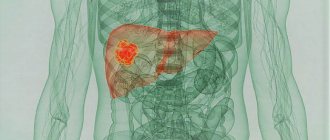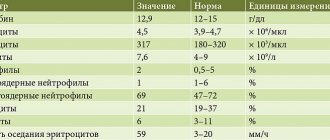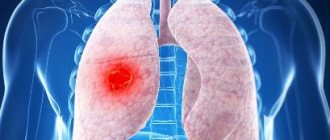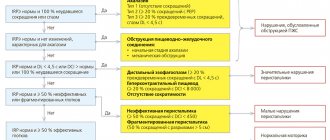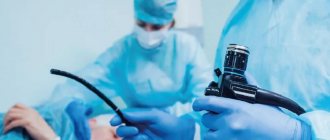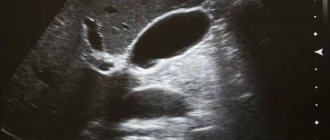Proctitis is an inflammatory disease that is localized in the rectum. First of all, it affects the intestinal mucosa. Very often, proctitis occurs together with sigmoiditis - inflammation of the sigmoid colon (in this case we are talking about proctosigmoiditis).
According to WHO, the risk of developing this disease is observed in 60% of residents of developed countries. Therefore, it is important to remember that early diagnosis plays an important role in the treatment of this disease. Over time, untreated proctitis develops complications and becomes chronic.
At CELT you can get a consultation with a proctologist.
- Initial consultation – 3,000
- Repeated consultation – 2,000
Make an appointment
Causes of the disease
The cause of the disease is the inflammatory process. The reason for the development of the disease can be a variety of factors:
- Excessive consumption of hot foods, spices and alcohol (proctitis of nutritional origin).
- Gonorrheal – occurs as a complication of gonorrhea, usually due to incorrect treatment of the underlying disease.
- “Congestive” – this form affects people suffering from constipation. It may occur against the background of trauma to the intestinal walls.
- Radiation – occurs after a course of radiotherapy aimed at the pelvic organs. Currently, innovative irradiation techniques are used, and the risk of developing radiation proctitis is reduced. Previously, this form of the disease was quite common.
- The parasitic form affects individuals suffering from parasitic intestinal infestations by protozoa and helminths.
There are diseases and conditions that do not directly cause proctitis, but contribute to its development and seriously increase the risk of the disease:
- Hypothermia.
- Inflammation, intestinal injury.
- Haemorrhoids.
- Infectious diseases of the rectum.
- Anal fissures.
- Paraproctitis.
- Abscesses of the intestinal wall.
- Inflammatory diseases of neighboring organs.
- Infectious diseases of the genitourinary system.
Consequences of radiation therapy
The treatment process is not without its drawbacks; during radiotherapy, general radiation reactions and local changes in the affected area may occur.
General reactions occur throughout the body, both as a reaction to radiation and to the process of decay of tumor tissues with the release of metabolic products. The severity of reactions depends on the total dose and the specific radiation technology. Today, general reactions are not very pronounced; they do not require long breaks in treatment or discontinuation of this method of therapy. These include:
- weakness and fatigue;
- dizziness with headache;
- nausea;
- irritability.
These reactions usually go away on their own within about 3-4 weeks.
Local reactions are divided into early (occur up to 3 months) and late (after this time) changes. They are varied and depend on the specific irradiation area and tissue type. On the skin side, dermatitis, ulcers, and hair loss are possible. On the part of the mucous membranes, erosions, ulcers, dryness, and inflammation are typical. If it is the abdominal cavity, problems with stool, cramps, and abdominal discomfort may occur. Irradiation of the chest can lead to radiation pneumonia, esophagitis, and pericarditis. Inflammatory processes in the area of nervous tissue and osteoporosis may also occur.
Most of these changes are temporary and disappear during rehabilitation after radiation therapy.
Symptoms and forms of the disease
Based on clinical manifestations, there are two main forms – acute and chronic. These two varieties most clearly differ from each other in the symptoms and complaints of the patient.
- It begins suddenly, without preconditions or malaise.
- Body temperature rises to 38-40 degrees.
- Chills occur.
- False urges to go to the toilet appear, and at the same time constipation appears.
- Pain in the rectum is often accompanied by a feeling of heaviness.
- There is a burning sensation and itching in the anal area.
- There may be blood in the stool.
Acute proctitis occurs quite rarely, much more often patients present with the chronic form. At the same time, an acute disease occurs with great discomfort for the patient. The patient's subjective sensations are very unpleasant. Symptoms of the acute form force you to consult a proctologist immediately.
There are several morphological forms of acute proctitis:
- Catarrhal hemorrhagic proctitis. This form of the disease is characterized by severe swelling of the intestinal mucosa. Non-systemic submucosal hemorrhages (hemorrhages) occur.
- Catarrhal mucous proctitis is characterized by the accumulation of large amounts of mucus in the intestinal lumen.
- Catarrhal purulent proctitis is characterized by the presence of pus on the surface of the edematous mucosa.
- Separately, the polypous form is distinguished when, upon examination, polyps are detected on the intestinal mucosa.
- Erosive, ulcerative proctitis is a special form. It is characterized by the formation of long-term non-healing erosions and/or ulcers on the rectal mucosa.
Ulcerative proctitis is one of the most severe forms of proctitis. Upon examination, you can find many lesions and ulcers on the intestinal walls. The course of the disease is characterized by the slow spread of the pathological process; inflammation affects one part of the intestine and spreads further. This may be a manifestation of a serious inflammatory disease - nonspecific ulcerative colitis (UC).
2. Symptoms of radiation colitis
Radiation colitis begins like many other inflammatory diseases of the large intestine. The clinical picture unfolds gradually, starting with minor discomfort in the digestive system. Over time, symptoms increase and acquire typical signs of colitis:
- cramping abdominal pain;
- sudden strong urge to defecate;
- diarrhea;
- fragments of blood and mucus in the stool;
- constipation;
- the urge to defecate in the absence of feces (tanesma).
Radiation colitis, which develops directly during a course of radiation or immediately after receiving high doses of radiation, can be very severe, accompanied by intestinal bleeding, dehydration and ulceration in the intestine. This condition requires emergency care.
Visit our Gastroenterology page
Chronic proctitis
The chronic form of the disease is widespread. It occurs unnoticed, so in the first stages of the disease, patients do not rush to see a doctor.
Standard disturbing symptoms are practically absent, often only local discomfort is observed:
- Irritation in the anal area.
- Discomfort before or after bowel movement.
- Burning, itching in the rectal area.
These symptoms do not cause concern in patients at first. Many patients prefer to treat themselves or simply wait. It is important to know that this is a fundamentally wrong approach: without treatment, the pathological process only intensifies. If you do not follow a diet, then “wrong” food in the absence of treatment will provoke increased secretion of mucus and pus, the progression of the disease.
Chronic proctitis can cause many serious complications. In some cases, you will have to resort to surgical treatment. The key to recovery is a timely visit to a proctologist, diagnosis and compliance with all doctor’s recommendations.
Features of recovery after radiation therapy
The patient is recommended to have an enhanced, fortified diet, sufficient fluid intake, regular exposure to fresh air, and protection from infectious diseases. If certain symptoms occur, the doctor prescribes a course of medications to correct digestive, neurological, and inflammatory phenomena. In some cases, it is necessary to stimulate the process of hematopoiesis and support immune functions.
The doctor carefully monitors the changes that occur in the patient’s body during the rehabilitation period, adjusting the recovery plan. This makes it possible to promptly prevent complications that arise during the period after irradiation of a cancerous tumor.
Diagnosis and treatment of proctitis
Endoscopic polypectomy of the intestines and stomach
- Cost: 15,000 - 40,000 rubles.
- Duration: 5-15 minutes
- Hospitalization: 1-3 days
More details
Diagnosis begins with collecting anamnesis. The proctologist interviews the patient, clarifies complaints and the history of the disease. Usually instrumental studies are prescribed, since the chronic form does not have a specific clinical picture and is difficult to recognize only from the patient’s complaints. Diagnostics consists of examination, instrumental studies and laboratory tests. During the examination, the proctologist performs a digital examination of the intestine, anoscopy, and sigmoidoscopy (instrumental endoscopic examination of the rectum).
To assess inflammation, laboratory diagnostic tests are performed:
- Stool tests (coprogram, microflora culture, calprotectin).
- Clinical tests of blood and urine.
- Cytological and histological studies of intestinal material taken during biopsy during examination, and others.
Modern methods of diagnosis and treatment allow therapy to be carried out in an outpatient setting. The patient does not have to be in a medical hospital. First of all, the patient is explained the features of the diet, without which treatment is impossible: avoidance of alcohol, spicy, fried, fatty foods, herbs and spices.
Based on the results of laboratory tests, treatment is selected, including antibacterial therapy (depending on the causative agent of inflammation). Local anti-inflammatory drugs are used in the form of suppositories and microenemas. They help alleviate the condition and relieve the main symptoms.
To combat constipation and maintain normal bowel function, a number of procedures are prescribed: from medications to special exercises. It is generally accepted that proper treatment is a set of measures, each of which is important in its own way.
In some cases, surgical treatment may be used - for example, for polyps. The need and scope of the operation are calculated individually for each case.
Prognosis and prevention
Prevention of the development of complications is the timely treatment of any acute gastrointestinal diseases, as well as observation by a doctor and correction of chronic diseases of the stomach and intestines.
The prognosis for proctitis is generally favorable: with proper treatment, it is possible to completely eliminate the manifestations of the acute form of the disease. Treatment of chronic proctitis lasts almost a long time, and episodes of exacerbations are possible. The success of therapy depends on the individual characteristics of the body, as well as on compliance with the treatment plan.
At the CELT clinic, leading specialists consult on your health issues. Polite and friendly doctors will help you recover. The CELT proctology service offers consultations with high-class proctologists. Start treatment on time and you won’t have to suffer from the disease for years.
Make an appointment through the application or by calling +7 +7 We work every day:
- Monday—Friday: 8.00—20.00
- Saturday: 8.00–18.00
- Sunday is a day off
The nearest metro and MCC stations to the clinic:
- Highway of Enthusiasts or Perovo
- Partisan
- Enthusiast Highway
Driving directions
Impact on biological tissues
When ionizing radiation enters a cell, it causes the chemical bonds in substances to break, causing the cellular structures to stop doing their job properly. There are no structures in the cell that are resistant to radiation, although their susceptibility to it differs, and the severity of the changes depends on the radiation dose.
One of the leading causes of cell death is damage to the genetic apparatus. In some cases, the cell dies immediately, in others it tries to recover, but DNA damage leads to the fact that its offspring also die after several division cycles. However, if the radiation dose turned out to be insufficient for pronounced changes, the cell is completely restored after 2-6 hours.
The most sensitive to the effects of radiation are those cells that are in the process of dividing. This allows the use of radiotherapy in the treatment of cancer: growing tumor cells are more susceptible to the harmful effects of radiation than healthy tissue.
Most malignant neoplasms are highly sensitive to the effects of radiation, so in countries with developed medicine, more than half of cancer patients undergo radiation therapy at one stage or another. The percentage of such patients is gradually increasing, since modern medicine makes it possible to implement the main principle of radiotherapy - delivering a large dose of radiation to the tumor, protecting healthy tissue from damage. New methods of external radiotherapy significantly reduce the radiation dose to the patient, ensuring better tolerability of treatment. It is impossible to protect healthy tissues from ionizing radiation 100%. Therefore, some patients may experience certain complications after radiation therapy.

